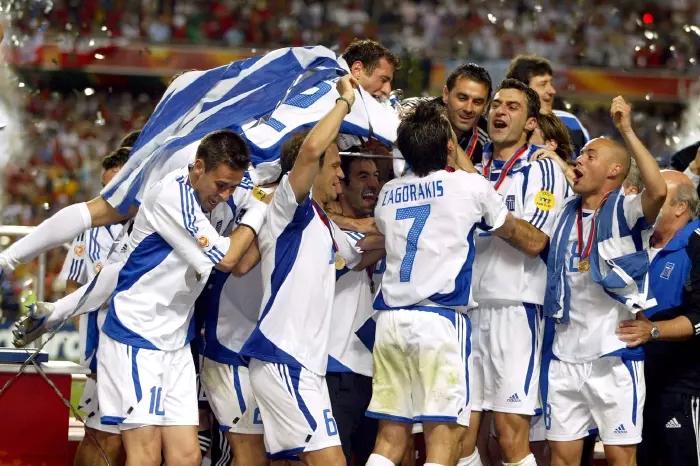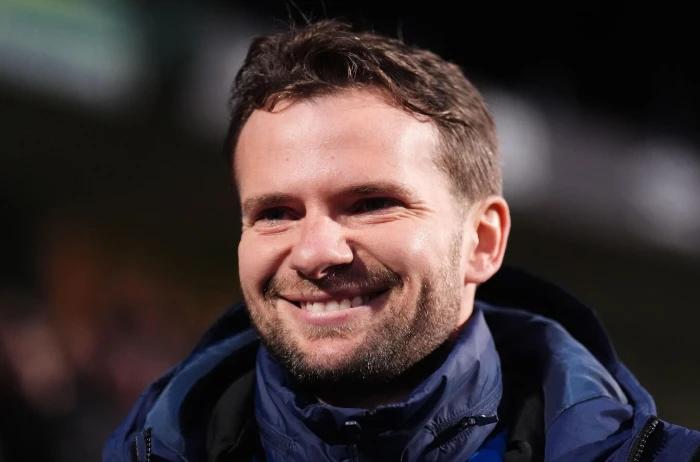Against All Odds: How Greece won the 2004 European Championship as 150/1 outsiders

Otto Rehhagel’s side first concentrated on nullifying their opponents, a tactic that might sound familiar to England fans.
Hailed as a victory for the dour over the delightful, is it fair to compare Gareth Southgate's pragmatic style to that of the Greeks?
Here, Planet Sport looks back at the story behind one of the greatest upsets in sporting history.
New era begins in Manchester
The national team had just arrived in Manchester for their final 2002 World Cup qualifying game against England on October 6. The Three Lions needed to dispatch the Greeks who were seen as relatively easy meat considering they were already out. The Ethniki were led by their new manager, Otto Rehhagel, who was looking ahead to his second game in charge.
His debut with Greece came a month earlier and it was one to forget. Rehhagel's side were completely dismantled in a 5-1 defeat to Finland which certainly gave the Greek FA cold feet regarding their choice of manager.
Greece took the lead in the first half courtesy of Angelos Charisteas. The 66,000 fans at Old Trafford shook their heads in disbelief. The Three Lions, managed at the time by Sven-Goran Eriksson, were level on points with Germany in their qualifying group and with only one team progressing to the 2002 World Cup automatically, England needed to win - or at least match - Germany's result against Finland.
England needed a goal as the clock hit the 93rd minute. The hosts were awarded a free-kick and David Beckham stepped up to take it. His curling effort squeezed into the top corner as the capacity crowd in Manchester exploded in euphoria. England had got the equaliser. They had got the point to take them back to the top of the group and secured their place at the World Cup.
Qualifying for Portugal
Rehhagel's men may have kicked off their qualifying campaign with successive defeats against Spain and Ukraine, but those turned out to be their only losses for over a year as Greece went on an unprecedented 15-match unbeaten run.

Greece line up ahead of their 2003 European Championship qualifier against Northern Ireland - they won 2-0
While the soccer itself might not have been thrilling, the defensively-minded Rehhagel had turned his side into a clean-sheet machine. Out of the eight qualifying games, Greece only scored eight goals - only one more than Albania who finished second from bottom. However, unlike Albania, they only conceded four times.
It was to be a theme that would continue not only throughout 2003 but also throughout the 2004 European Championship, which was right on the horizon.
Only Latvia were bigger underdogs...
After 24 years away, Greece were back at the Euros. But despite their impressive qualifying campaign, nobody was getting carried away. In fact, only Latvia were bigger underdogs than the Greeks, who were priced at 150/1 to go all the way.
Even Greece left-back Takis Fyssas wasn't contemplating a long run in the tournament. He and his fiancee set July 9 as the date for their wedding; five days after the European Championship final.
Greece vs Portugal: Round one
The opening game of the tournament saw Greece come up against the host nation, Portugal. The Estadio do Dragao in Porto was packed to the brim when the opening ceremony eventually came to an end and Pierluigi Collina got the game underway.
Greece reached the half-time break with their 1-0 lead intact. Portugal, on the other hand, were clearly flustered and decided to bring on Cristiano Ronaldo and Deco for the second period.
Eyes set on the quarter-finals
Greece lined up against Spain in their second group game. The Spaniards were familiar foes for Rehhagel's men, having played them twice in the qualifying group; losing the first game and winning the other.
Zidane, Henry and Pires no match for Rehhagel's tactics
Before the tournament, the Greeks were content with simply making the competition. But now Greece were in the last eight and preparing to face the 1998 World Cup winners, France.
The French team, including Zinedine Zidane, Thierry Henry and Robert Pires, were big favourites. This was a team that had a global superstar in almost every position. What's more, after an embarrassing group-stage exit at the 2002 World Cup, this was a team desperate to put things right.
Rehhagel knew the game plan which got them to this point would not be enough to get past the French. With that in mind, the German decided to shake things up. Giourkas Seitaridis was given the task of man-marking French dangerman Henry. The rest of the team would play zonal defence in order to try and keep their opponents at bay.
The only underdogs in history who nobody wanted to see win
The 150/1 underdogs were now one of four teams left in the competition. All that stood between them and a place in the final was a much-adored Czech Republic side.
While Greece bored fans with their pragmatic and methodical style of play, the Czechs gained newfound popularity with their offensively-minded tactics and free-scoring nature.
Rehhagel was a proponent of this style. Even during his Werder Bremen days, he led the club to a Bundesliga title in 1988 and in the process, won the competition with the fewest goals conceded (22). It is a record that's only been beaten once since.
Despite defying the odds at every stage, Greece were far from loved by the soccer community. In fact, they were seen as negative, boring and even accused of killing the spectacle of the European Championship. The Guardian described them as "the only underdogs in history who everyone wants to see get beaten".
The game with the Czech Republic was played at the Estadio do Dragao in Porto - the same ground in which Greece got the better of Portugal in the tournament's opener. Strangely enough, the game was also officiated by the same man: Pierluigi Collina.
Greece vs Portugal: Round two
The Greeks were now one of two nations left in the European Championship. Portugal would be their opponents. The match which kicked off the tournament would now bring the competition to a close.
Greece had already proved that they were capable of beating the Portuguese. However, now things were different - very different.
The greatest achievement in soccer history?
At least with the current COVID restrictions on wedding guests, that is not something any of England's young lions will have to worry about should they etch their names into history alongside Greece on July 11.













